#falwell
Explore tagged Tumblr posts
Text

promise?
#what the fuck is the school choice community. the klan?#ooooo i want public schools to be defunded so my kid can go to a segragated religious school on govt money. ok jerry falwell#I have some issues with Timmy but this is the better pick
185 notes
·
View notes
Text

One of the most durable myths in recent history is that the religious right, the coalition of conservative evangelicals and fundamentalists, emerged as a political movement in response to the U.S. Supreme Court’s 1973 Roe v. Wade ruling legalizing abortion. The tale goes something like this: Evangelicals, who had been politically quiescent for decades, were so morally outraged by Roe that they resolved to organize in order to overturn it.

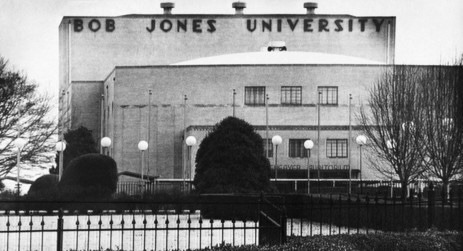
This myth of origins is oft repeated by the movement’s leaders. In his 2005 book, Jerry Falwell, the firebrand fundamentalist preacher, recounts his distress upon reading about the ruling in the Jan. 23, 1973, edition of the Lynchburg News: “I sat there staring at the Roe v. Wade story,” Falwell writes, “growing more and more fearful of the consequences of the Supreme Court’s act and wondering why so few voices had been raised against it.” Evangelicals, he decided, needed to organize.
Some of these anti- Roe crusaders even went so far as to call themselves “new abolitionists,” invoking their antebellum predecessors who had fought to eradicate slavery.
But the abortion myth quickly collapses under historical scrutiny. In fact, it wasn’t until 1979—a full six years after Roe—that evangelical leaders, at the behest of conservative activist Paul Weyrich, seized on abortion not for moral reasons, but as a rallying-cry to deny President Jimmy Carter a second term. Why? Because the anti-abortion crusade was more palatable than the religious right’s real motive: protecting segregated schools. So much for the new abolitionism.
Today, evangelicals make up the backbone of the pro-life movement, but it hasn’t always been so. Both before and for several years after Roe, evangelicals were overwhelmingly indifferent to the subject, which they considered a “Catholic issue.” In 1968, for instance, a symposium sponsored by the Christian Medical Society and Christianity Today, the flagship magazine of evangelicalism, refused to characterize abortion as sinful, citing “individual health, family welfare, and social responsibility” as justifications for ending a pregnancy. In 1971, delegates to the Southern Baptist Convention in St. Louis, Missouri, passed a resolution encouraging “Southern Baptists to work for legislation that will allow the possibility of abortion under such conditions as rape, incest, clear evidence of severe fetal deformity, and carefully ascertained evidence of the likelihood of damage to the emotional, mental, and physical health of the mother.” The convention, hardly a redoubt of liberal values, reaffirmed that position in 1974, one year after Roe, and again in 1976.
When the Roe decision was handed down, W. A. Criswell, the Southern Baptist Convention’s former president and pastor of First Baptist Church in Dallas, Texas—also one of the most famous fundamentalists of the 20th century—was pleased: “I have always felt that it was only after a child was born and had a life separate from its mother that it became an individual person,” he said, “and it has always, therefore, seemed to me that what is best for the mother and for the future should be allowed.”
Although a few evangelical voices, including Christianity Today magazine, mildly criticized the ruling, the overwhelming response was silence, even approval. Baptists, in particular, applauded the decision as an appropriate articulation of the division between church and state, between personal morality and state regulation of individual behavior. “Religious liberty, human equality and justice are advanced by the Supreme Court abortion decision,” wrote W. Barry Garrett of Baptist Press.
So what then were the real origins of the religious right? It turns out that the movement can trace its political roots back to a court ruling, but not Roe v. Wade.
In May 1969, a group of African-American parents in Holmes County, Mississippi, sued the Treasury Department to prevent three new whites-only K-12 private academies from securing full tax-exempt status, arguing that their discriminatory policies prevented them from being considered “charitable” institutions. The schools had been founded in the mid-1960s in response to the desegregation of public schools set in motion by the Brown v. Board of Education decision of 1954. In 1969, the first year of desegregation, the number of white students enrolled in public schools in Holmes County dropped from 771 to 28; the following year, that number fell to zero.
In Green v. Kennedy (David Kennedy was secretary of the treasury at the time), decided in January 1970, the plaintiffs won a preliminary injunction, which denied the “segregation academies” tax-exempt status until further review. In the meantime, the government was solidifying its position on such schools. Later that year, President Richard Nixon ordered the Internal Revenue Service to enact a new policy denying tax exemptions to all segregated schools in the United States. Under the provisions of Title VI of the Civil Rights Act, which forbade racial segregation and discrimination, discriminatory schools were not—by definition—“charitable” educational organizations, and therefore they had no claims to tax-exempt status; similarly, donations to such organizations would no longer qualify as tax-deductible contributions.
On June 30, 1971, the United States District Court for the District of Columbia issued its ruling in the case, now Green v. Connally (John Connally had replaced David Kennedy as secretary of the Treasury). The decision upheld the new IRS policy: “Under the Internal Revenue Code, properly construed, racially discriminatory private schools are not entitled to the Federal tax exemption provided for charitable, educational institutions, and persons making gifts to such schools are not entitled to the deductions provided in case of gifts to charitable, educational institutions.”
Paul Weyrich, the late religious conservative political activist and co-founder of the Heritage Foundation, saw his opening.
In the decades following World War II, evangelicals, especially white evangelicals in the North, had drifted toward the Republican Party—inclined in that direction by general Cold War anxieties, vestigial suspicions of Catholicism and well-known evangelist Billy Graham’s very public friendship with Dwight Eisenhower and Richard Nixon. Despite these predilections, though, evangelicals had largely stayed out of the political arena, at least in any organized way. If he could change that, Weyrich reasoned, their large numbers would constitute a formidable voting bloc—one that he could easily marshal behind conservative causes.
“The new political philosophy must be defined by us [conservatives] in moral terms, packaged in non-religious language, and propagated throughout the country by our new coalition,” Weyrich wrote in the mid-1970s. “When political power is achieved, the moral majority will have the opportunity to re-create this great nation.” Weyrich believed that the political possibilities of such a coalition were unlimited. “The leadership, moral philosophy, and workable vehicle are at hand just waiting to be blended and activated,” he wrote. “If the moral majority acts, results could well exceed our wildest dreams.”
But this hypothetical “moral majority” needed a catalyst—a standard around which to rally. For nearly two decades, Weyrich, by his own account, had been trying out different issues, hoping one might pique evangelical interest: pornography, prayer in schools, the proposed Equal Rights Amendment to the Constitution, even abortion. “I was trying to get these people interested in those issues and I utterly failed,” Weyrich recalled at a conference in 1990.
The Green v. Connally ruling provided a necessary first step: It captured the attention of evangelical leaders , especially as the IRS began sending questionnaires to church-related “segregation academies,” including Falwell’s own Lynchburg Christian School, inquiring about their racial policies. Falwell was furious. “In some states,” he famously complained, “It’s easier to open a massage parlor than a Christian school.”
One such school, Bob Jones University—a fundamentalist college in Greenville, South Carolina—was especially obdurate. The IRS had sent its first letter to Bob Jones University in November 1970 to ascertain whether or not it discriminated on the basis of race. The school responded defiantly: It did not admit African Americans.
Although Bob Jones Jr., the school’s founder, argued that racial segregation was mandated by the Bible, Falwell and Weyrich quickly sought to shift the grounds of the debate, framing their opposition in terms of religious freedom rather than in defense of racial segregation. For decades, evangelical leaders had boasted that because their educational institutions accepted no federal money (except for, of course, not having to pay taxes) the government could not tell them how to run their shops—whom to hire or not, whom to admit or reject.
The Civil Rights Act, however, changed that calculus.
(continue reading)
#politics#republicans#paul weyrich#abortion#religious riech#bob jones university#jerry falwell#christian nationalism#white supremacy#desegregation#project 2025#roe v wade#reproductive rights#reproductive justice#healthcare#brown v board of education#heritage foundation#moral majority#religious freedom#religion
195 notes
·
View notes
Text
On the fires in the Los Angeles area:
American right-wing fundamentalist "Christians" Pat Robertson and Jerry Falwell pissed off extraordinary numbers of Americans when they shared their views of what brought about the terrorist attacks of 9/11/2001.
Said Falwell:
"Throwing God out successfully with the help of the federal court system, throwing God out of the public square, out of the schools. The abortionists have got to bear some burden for this because God will not be mocked. And when we destroy 40 million little innocent babies, we make God mad." "...[T]he pagans and the abortionists and the feminists and the gays and the lesbians who are actively trying to make that an alternative lifestyle, the ACLU, People for the American Way — all of them who have tried to secularize America, I point the finger in their face and say 'you helped this happen.'" "Well, I totally concur," responded Robertson.
They asserted that their own (supposedly omnibenevolent) God visited these Islamist terrorist attacks on the United States...because God didn't like the direction politics had taken (away from Christian Nationalism, towards religious freedom, and towards the bodily autonomy and legal equality of women). God, in their view, hated what/who they hated, and that's why God brought these attacks upon the United States.
People were outraged by this for many excellent reasons. Among them was how these men abused a terrible tragedy in order to attack the things they always attacked. Islamist terrorists attacked the US, they claimed, because the US did not sufficiently persecute American women, LGBTQ+ Americans, or the enemies of Christian Nationalism. It was a monstrous, disgusting thing to assert and they were rightly excoriated.
That excoriation was so intense that Falwell (a man who had no conscience whatsoever) actually had to apologize. The apology, however, wouldn't stick because Falwell pretended at being a victim of a smear campaign.
...two weeks after Falwell apologized to God and Geraldo, the Jerry Falwell Ministries sent out a fundraising letter written by Falwell's son, the Rev. Jonathan Falwell. The letter charged that "Satan has launched a hail of fiery darts at dad" and that "liberals, and especially gay activists, have launched a vicious smear campaign to discredit him." The younger Falwell suggested that supporters could assuage the elder Falwell's "personal hurt" by sending "a special Vote of Confidence gift for Jerry Falwell of at least $50 or even $100."
Falwell was a garbage human being. When he died, Christopher Hitchens found a polite way to say on national television how incredibly full of shit Falwell was:
“If you gave Falwell an enema, he could be buried in a matchbox.”
My thoughts keep returning to Falwell and Robertson when I read about Code Pink and JVP (Jewish Cosplayers for Peace) blaming the fires in the Los Angeles area on Israel.
Code Pink reportedly posted on Instagram:
“When US taxes go to burning people alive in Gaza, we can’t be surprised when those fires come home.”
The post about it on their web site never really makes a connection, except to also accuse Israel of environmental crimes, so just as Falwell asserted that God was punishing the US for politics Falwell didn't like, Code Pink believes the universe is punishing the US for for politics Code Pink doesn't like.
JVP also blames Israel for the Los Angeles fires.

Firefighting is not funded by the federal government and if the Los Angeles area firefighters had twice the budget, this still would have been a massive, horrible, tragic disaster...which JVP, just like Falwell and Roberts, crassly and disgustingly tries to leverage for their own political purposes.
But JVP isn't done. They also blame Israel for failings in Hurricane Helene relief for Appalachia

And now Israel is also, says JVP, responsible for global climate change.

In Our Lifetime is also getting in on the action.
Fatima Mohammed, a leader of the hardline anti-Israel group Within Our Lifetime, posts an image of the fires and says, “The flames of Gaza will not stop there.” “Dropping hundreds of thousands of bombs on Gaza, turning it into a blazing inferno, has consequences,” she says. “There are climate consequences that will find us all.”
God (Code Pink, JVP, and In Our Lifetime seem to say) hates who they hate: Israel.
This is a new antisemitic low, even for these Jew-hating groups.
New York Democratic Congressman Ritchie Torres said it well:
"The nature of Antisemitism is to scapegoat the Jewish People and the Jewish State for everything wrong in the world-no matter how tenuous the causal connection. Toward that end, the antisemites of Code Pink are blaming the Jewish State for the wildfires in California.
The modus operandi of Antisemitism is slanderous scapegoating: when in doubt, blame the Jews."
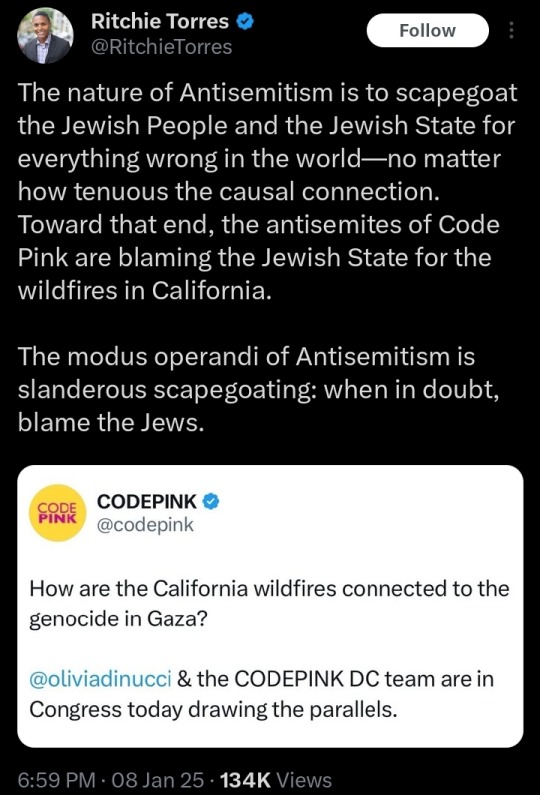
This is naked, obvious antisemitism.
It seems, though, that only a tiny fraction of non-Jewish liberals (like Torres) see these as analogous to Falwell and Robertson and see the obvious, historically consistent Jew hatred staring them in the face.
But this is worse: When they are called out for their antisemitism? They, like Falwell, will claim to be slandered victims and decry that their critics are slandering them to discredit their righteous crusade against Israel, and they'll raise money on it.
And it'll work. It's been working beautifully for them for about fifteen months.
#anti zionism#Antisemitism#Jew Hatred#Jvp#Jewish Cosplayers for Peace#Code Pink#In Our Lifetime#Jerry Falwell#pat robertson#momzers#jumblr#los angeles#los angeles fires#the illiberal left
58 notes
·
View notes
Text
Jerry Falwell Jr.

Physique: Average Build Height: 6'3" (1.91 m)
Jerry Lamon Falwell Jr. (born June 17, 1962) is an American attorney, former academic administrator, and evangelical, who took the helm of Liberty University in Lynchburg, Virginia, in 2007 upon his father's death, until his own fall from grace in August 2020 amidst a juicy sex scandal.





Now, some might say my interest in Jerry Jr. stems from my unresolved lust for his father, Jerry Falwell Sr. - and they'd be right, but let's not discount Jerry Jr.'s own merits as a fuckable daddy.





Born and bred in Lynchburg, he got his education from Liberty University for his BA and the University of Virginia for his law degree. His career was all about serving Liberty University, but not just in the spiritual sense. We're talking questionable real estate deals, self-dealing, online poll manipulation, and those steamy Miami nightclub visits.





Married to Becki Tilley, they live on a farm in Bedford County, Virginia, with their three kids. But let's dive into the scandal that made headlines: Becki's affair with a "pool boy" they met on vacation in Miami. The cuckolding was just the appetizer; there's a delicious rumor that Junior and the pool boy might have had their own private swim sessions.

All of this? Hot. Why? Firstly, because of the daddy issues with his father. Secondly, because I bet Jerry Sr. is spinning in his grave. But the cherry on top? Now I want to fuck Jerry Jr. even more. All he needs is to balloon up like his old man, and he'll be my perfect fantasy of righteous sin.
48 notes
·
View notes
Text
The Rev. Jerry Falwell

Featuring Rev. Jerry Falwell
Back in 1989, I was a student at Liberty University and in the office of the University president, Rev. Jerry Falwell for violating the school's personal ethics code. I got caught blowing a guy and you know who Rev. Falwell was, you know I was in trouble. Falwell was a so called champion of righteousness, waging a crusade against homosexuality so my time at Liberty was over.
With that being said, I couldn't help but admirer him. Your typical older white male in his late 50s or early 60s. He had greying hair. Not too bad, he had a cute quality to him. And if I was going out, I might as well go big and have some fun with him. I always had a thing for older guys.
I apologized, slowly licked my lips asked, "Is there something I can do to make up for the infraction?"
His face turned red and just shook his head as if there was nothing I could do. I bet he never had a man make a pass at him. His eyes quickly did a once over on me, and bingo. I do believe the good doctor here might have a thing for little ol' me.
We sat there for an awkward minute as he had his internal struggle whether to accept my proposal for sex or not. So I chose to take things to the next level as I got up and walked over to a wall with his accolades. He turned slightly in his chair, not knowing what to do next and I saw his bulge. I had him right where I wanted him I thought as I walked over to a bookcase by his desk and picked up a picture of him and who I assumed was his wife. She seemed like a hard nosed bitch.
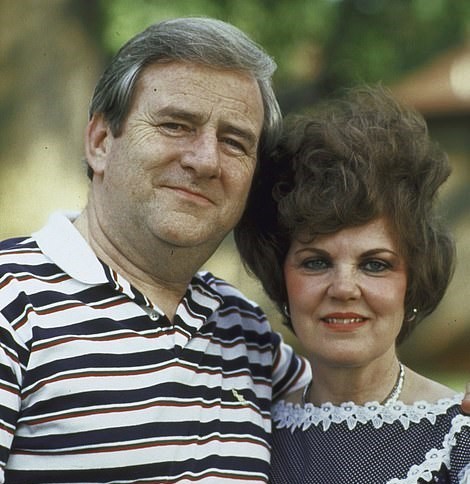
"Is this your wife Rev. Falwell," I asked.
"Yes, we've been married for 30 years." He answered. Ah, so he's been debating if he should cheat on his wife with a young piece of ass like me.
"She seems a bit intense, no?" I asked. He chuckled and almost immediately tried to hide it. I struck a nerve. I bet she was a prude with being only for procreating. And definitely no blow-jobs.
"Does she take good care of you, Rev. Falwell?" I gently asked, placing the picture back.
He froze so I took a small step towards him, but his lower lip seem to quiver a bit. As if words were trying to be formed, but my now sexual presence was suffocating him. I took another step forward and fixed his collar of his shirt. I looked into his eyes and whispered, "Rev. Falwell, does she suck your cock every night and morning? Does she make you feel good?"
I slowly shook his head no. I smiled meekly before kneeling in front of him. I licked my lips and said, "Rev. Falwell, I need another chance. Can't you find it in your heart to give me just one more chance."
With his lips still quivering, he nodded yes as I slid my hands up and down his legs. I put on my most sincere face and thanked him while my hands slid up his body and down his legs again. On the next pass I unbuckled his belt so I could undo his pants. I slid them down and was rewarded with a pretty decent cock. It was about 7 inches, thick, veiny and most importantly, hard. I licked from the bottom of his shaft to the tip as he shuddered in pleasure. I took in his musky smell and it felt so erotic. Then I slipped my lips over his manhood and went to work.
Rev. Falwell gripped the arms of his leather chair as I I could feel the veins on his cock as my lips glided up and down. His salty precum hit my tongue and I looked up at him. His glazed over eyes told me everything I needed to know. I had him right where I wanted him.
I continued my oral assault on him as I sucked him off for everything he was worth. He built enough courage to lay a hand on my shoulder and then on my head as my hands slipped under his ass so I could take him deeper. I let his cock hit the back of my throat a couple times to make that sound porn stars make in the videos. I was feeling real slutty as I released his cock from my mouth with a gasp and I jerked him off so I could catch my breathe.
"You're wife doesn't suck your cock like this does she." I asked, looking directly at him. He shook his head no as I slapped his cock against my lips and then my tongue.
Wanting to milk this old bastard and leave him wanting more, I was back to sucking and stroking his thick cock. My head bobbed as his moans got louder and louder. His hands gripped my shoulders as if he wanted me to stop but I wanted it. I wanted his cum. I wanted his satisfaction. He thrusted his hip as he could no longer hold it in anymore. With a last suck, his cock popped out of my mouth for the last time and he shot all over my face as I furiously jerked him off.
His cum sprayed all over my face and I could feel it slowly seep down it. Luckily it looked like he got everything by my eyes. I slowly opened them as I watched him panting as if he'd just ran a marathon. I licked my cum covered lips and tasted him before quickly cleaning all the cum off my face, but didn’t swallow it. Instead I moved quickly up and on top of Jerry until my face was over his. Rev. Falwell opened his mouth to say something and I started French kissing him with my mouth full of the old man’s cum.
Looking into his clear blue eyes, I saw a look of shock. Then he was surprisingly kissing me back. His tongue was every where inside my mouth, angry and as brutal as he could make it. I loved. As I wrapped my tongue around his and sucked, I could feel him swallowing his own cum as he sucked it out of my mouth.
Suddenly I felt his hand grasp my balls. I sucked in air as he tighten his grip on my tender testicles. Then as I started jerking and thrashing from the pain of his iron grip on my balls as we kissed like I had never before kissed someone. I thought he was going to rip my balls off as he squeezed and pulled on them. But a part of me love it.
When we finally broke our embrace, Jerry let go of my balls. And the moment he did that, I undid my pants and jerked them down along with my boxer shorts. My fat dick sprung up and stood straight out from my body. It was so hard it was throbbing. The old man's eyes got big as he looked at my thick dick against his mouth. I didn’t think Rev. Falwell would open his mouth, but then I guess he was so horned up he didn’t know what he was doing. The next thing I knew Rev. Falwell was sucking my dick.
I felt wonderful. But even better to look down at Rev. Jerry Falwell, the fundamentalist preacher who founded the Moral Majority while he had my dick in his mouth. I got so excited that I shot off. He gagged and tried to spit my dick out but I forced my dick in him, and made him swallow the entire load before pulling it out.
Needless to say, I wasn't kicked out of school that day.

60 notes
·
View notes
Text
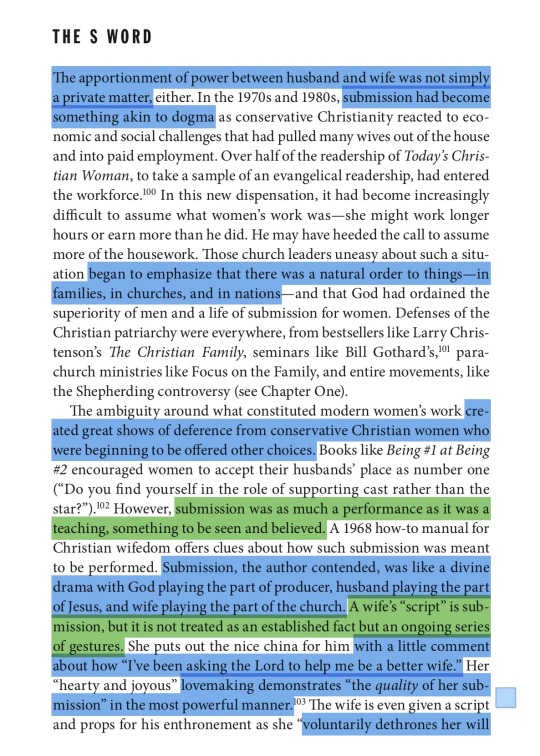
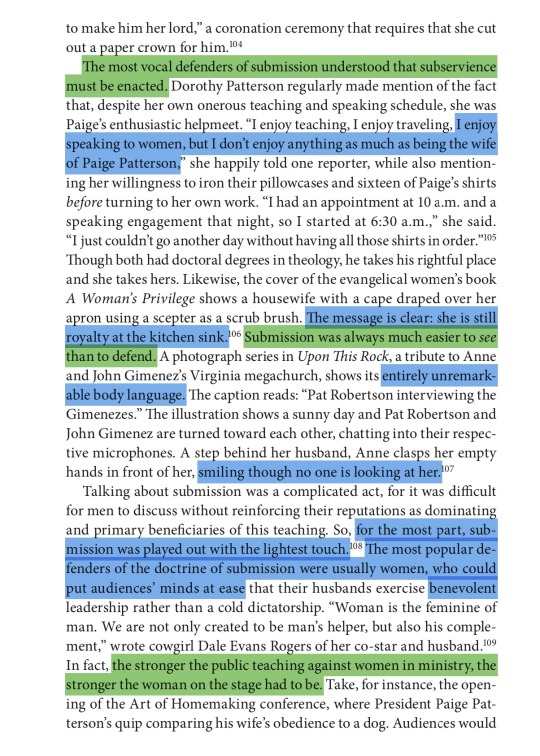
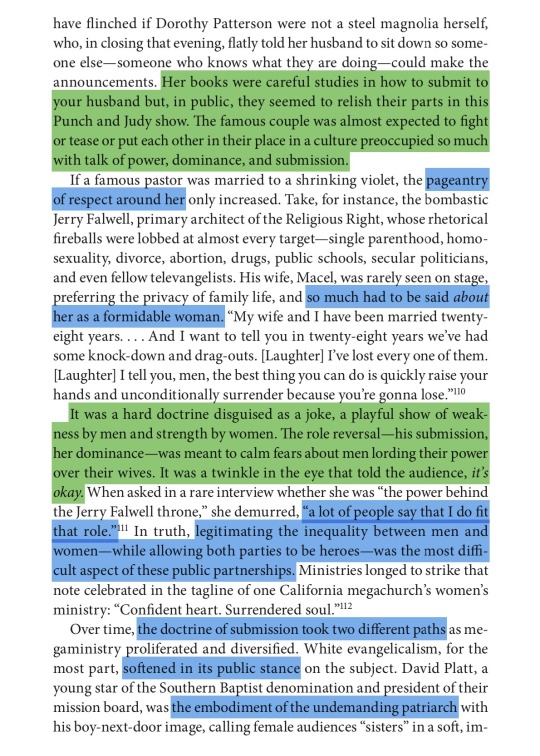
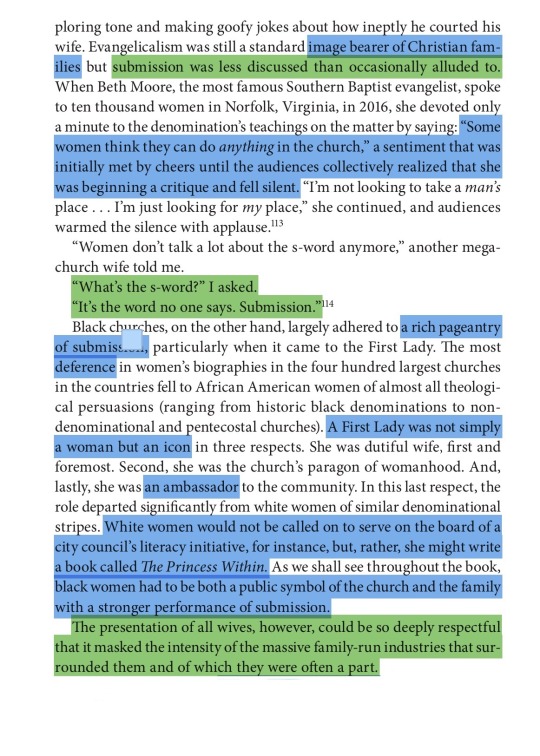
“The S Word” – on the performance of Christian patriarchy & the word no one says
from The Preacher’s Wife: The Precarious Power of Evangelical Women Celebrities by Kate Bowler (2019)
transcript under the cut
The apportionment of power between husband and wife was not simply a private matter, either. In the 1970s and 1980s, submission had become something akin to dogma as conservative Christianity reacted to economic and social challenges that had pulled many wives out of the house and into paid employment. Over half of the readership of Today’s Christian Woman, to take a sample of an evangelical readership, had entered the workforce. In this new dispensation, it had become increasingly difficult to assume what women’s work was—she might work longer hours or earn more than he did. He may have heeded the call to assume more of the housework.
Those church leaders uneasy about such a situation began to emphasize that there was a natural order to things—in families, in churches, and in nations—and that God had ordained the superiority of men and a life of submission for women. Defenses of the Christian patriarchy were everywhere, from bestsellers like Larry Christenson’s The Christian Family, seminars like Bill Gothard’s, parachurch ministries like Focus on the Family, and entire movements, like the Shepherding controversy (see Chapter One).
The ambiguity around what constituted modern women’s work created great shows of deference from conservative Christian women who were beginning to be offered other choices. Books like Being #1 at Being #2 encouraged women to accept their husbands’ place as number one (“Do you find yourself in the role of supporting cast rather than the star?”). However, submission was as much a performance as it was a teaching, something to be seen and believed.
A 1968 how-to manual for Christian wifedom offers clues about how such submission was meant to be performed. Submission, the author contended, was like a divine drama with God playing the part of producer, husband playing the part of Jesus, and wife playing the part of the church. A wife’s “script” is submission, but it is not treated as an established fact but an ongoing series of gestures. She puts out the nice china for him with a little comment about how “I’ve been asking the Lord to help me be a better wife.” Her “hearty and joyous” lovemaking demonstrates “the quality of her submission” in the most powerful manner. The wife is even given a script and props for his enthronement as she “voluntarily dethrones her will to make him her lord,” a coronation ceremony that requires that she cut out a paper crown for him.
The most vocal defenders of submission understood that subservience must be enacted. Dorothy Patterson regularly made mention of the fact that, despite her own onerous teaching and speaking schedule, she was Paige’s enthusiastic helpmeet. “I enjoy teaching, I enjoy traveling, I enjoy speaking to women, but I don’t enjoy anything as much as being the wife of Paige Patterson,” she happily told one reporter, while also mentioning her willingness to iron their pillowcases and sixteen of Paige’s shirts before turning to her own work. “I had an appointment at 10 a.m. and a speaking engagement that night, so I started at 6:30 a.m.,” she said. “I just couldn’t go another day without having all those shirts in order.”
Though both had doctoral degrees in theology, he takes his rightful place and she takes hers. Likewise, the cover of the evangelical women’s book A Woman’s Privilege shows a housewife with a cape draped over her apron using a scepter as a scrub brush. The message is clear: she is still royalty at the kitchen sink.
Submission was always much easier to see than to defend. A photograph series in Upon This Rock, a tribute to Anne and John Gimenez’s Virginia megachurch, shows its entirely unremarkable body language. The caption reads: “Pat Robertson interviewing the Gimenezes.” The illustration shows a sunny day and Pat Robertson and John Gimenez are turned toward each other, chatting into their respective microphones. A step behind her husband, Anne clasps her empty hands in front of her, smiling though no one is looking at her.
Talking about submission was a complicated act, for it was difficult for men to discuss without reinforcing their reputations as dominating and primary beneficiaries of this teaching. So, for the most part, submission was played out with the lightest touch. The most popular defenders of the doctrine of submission were usually women, who could put audiences’ minds at ease that their husbands exercise benevolent leadership rather than a cold dictatorship. “Woman is the feminine of man. We are not only created to be man’s helper, but also his complement,” wrote cowgirl Dale Evans Rogers of her co-star and husband.
In fact, the stronger the public teaching against women in ministry, the stronger the woman on the stage had to be. Take, for instance, the opening of the Art of Homemaking conference, where President Paige Patterson’s quip comparing his wife’s obedience to a dog. Audiences would have flinched if Dorothy Patterson were not a steel magnolia herself, who, in closing that evening, flatly told her husband to sit down so someone else—someone who knows what they are doing—could make the announcements.
Her books were careful studies in how to submit to your husband but, in public, they seemed to relish their parts in this Punch and Judy show. The famous couple was almost expected to fight or tease or put each other in their place in a culture preoccupied so much with talk of power, dominance, and submission.
If a famous pastor was married to a shrinking violet, the pageantry of respect around her only increased. Take, for instance, the bombastic Jerry Falwell, primary architect of the Religious Right, whose rhetorical fireballs were lobbed at almost every target—single parenthood, homosexuality, divorce, abortion, drugs, public schools, secular politicians, and even fellow televangelists. His wife, Macel, was rarely seen on stage, preferring the privacy of family life, and so much had to be said about her as a formidable woman.
“My wife and I have been married twenty-eight years. . . . And I want to tell you in twenty-eight years we’ve had some knock-down and drag-outs. [Laughter] I’ve lost every one of them. [Laughter] I tell you, men, the best thing you can do is quickly raise your hands and unconditionally surrender because you’re gonna lose.”
It was a hard doctrine disguised as a joke, a playful show of weakness by men and strength by women. The role reversal—his submission, her dominance—was meant to calm fears about men lording their power over their wives. It was a twinkle in the eye that told the audience, it’s okay.
When asked in a rare interview whether she was “the power behind the Jerry Falwell throne,” she demurred, “a lot of people say that I do fit that role.” In truth, legitimating the inequality between men and women—while allowing both parties to be heroes—was the most difficult aspect of these public partnerships. Ministries longed to strike that note celebrated in the tagline of one California megachurch’s women’s ministry: “Confident heart. Surrendered soul.”
Over time, the doctrine of submission took two different paths as megaministry proliferated and diversified. White evangelicalism, for the most part, softened in its public stance on the subject. David Platt, a young star of the Southern Baptist denomination and president of their mission board, was the embodiment of the undemanding patriarch with his boy-next-door image, calling female audiences “sisters” in a soft, imploring tone and making goofy jokes about how ineptly he courted his wife.
Evangelicalism was still a standard image bearer of Christian families but submission was less discussed than occasionally alluded to. When Beth Moore, the most famous Southern Baptist evangelist, spoke to ten thousand women in Norfolk, Virginia, in 2016, she devoted only a minute to the denomination’s teachings on the matter by saying: “Some women think they can do anything in the church,” a sentiment that was initially met by cheers until the audiences collectively realized that she was beginning a critique and fell silent. “I’m not looking to take a man’s place . . . I’m just looking for my place,” she continued, and audiences warmed the silence with applause.
“Women don’t talk a lot about the s-word anymore,” another megachurch wife told me.
“What’s the s-word?” I asked.
“It’s the word no one says. Submission.”
Black churches, on the other hand, largely adhered to a rich pageantry of submission, particularly when it came to the First Lady. The most deference in women’s biographies in the four hundred largest churches in the countries fell to African American women of almost all theological persuasions (ranging from historic black denominations to non-denominational and pentecostal churches).
A First Lady was not simply a woman but an icon in three respects. She was dutiful wife, first and foremost. Second, she was the church’s paragon of womanhood. And, lastly, she was an ambassador to the community. In this last respect, the role departed significantly from white women of similar denominational stripes. White women would not be called on to serve on the board of a city council’s literacy initiative, for instance, but, rather, she might write a book called The Princess Within. As we shall see throughout the book, black women had to be both a public symbol of the church and the family with a stronger performance of submission.
The presentation of all wives, however, could be so deeply respectful that it masked the intensity of the massive family-run industries that surrounded them and of which they were often a part.
#kate bowler#quotes#christian patriarchy#headship#exvangelical#christian history#dorothy patterson#jerry falwell#paige patterson#patriarchy#misogyny#misogynoir#image described#the preacher’s wife#mac’s bookshelf#christianity tw#❌ian patriarchy
19 notes
·
View notes
Text
I started watching that Marzgurl Vic Migogna documentary and I keep wincing
8 notes
·
View notes
Text

So this was posted in a comic group im in an the poster said it was weird how the writers had supervillains like Doom be horrified by 9/11 but then made up some American preacher saying America had it coming
For you young'uns; no, that is a real quote
The guy on the left is Jerry Falwell, a racist, misogynistic, anti-semitic, anti-Catholic, and anti-gay Evangelical preacher who is one of the founders of the religious right in America. 2 days after 9/11 gave a sermon:
"I really believe that the pagans, and the abortionists, and the feminists, and the gays and the lesbians who are actively trying to make that an alternative lifestyle, the ACLU, People For the American Way, all of them who have tried to secularize America. I point the finger in their face and say 'you helped this happen.'"
Because sometimes comic book supervillains are more moral and nuanced than real people
13 notes
·
View notes
Text


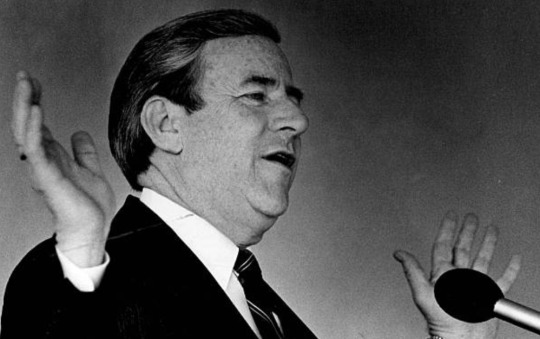



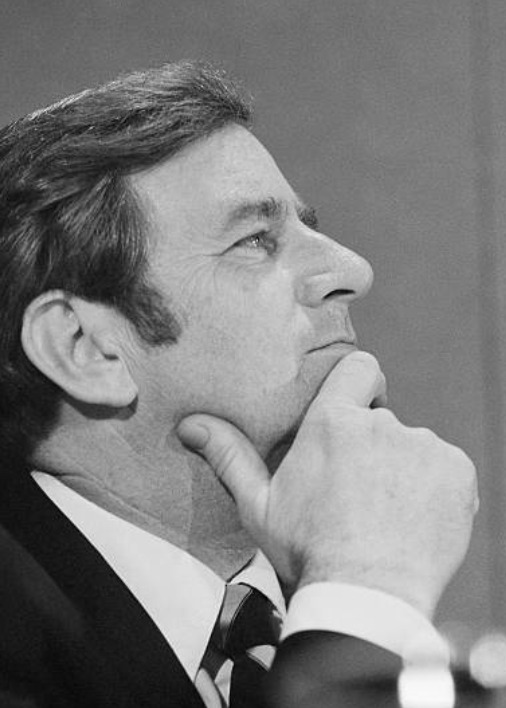













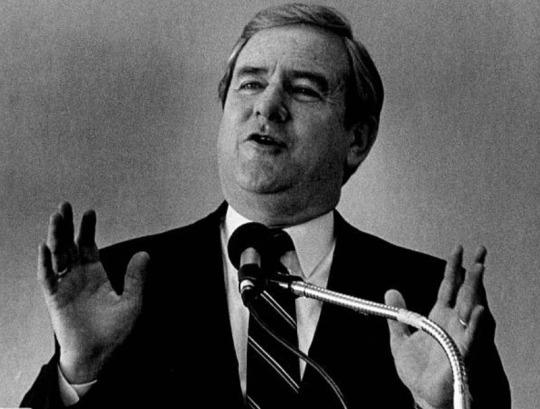

Jerry Falwell founded his church inside a bottling plant for Donald Duck Soda.
31 notes
·
View notes
Text
this was an addition on another post but I thought it deserved its own because I keep seeing posts about marriage that would fit in on right wing conspiracy YouTube
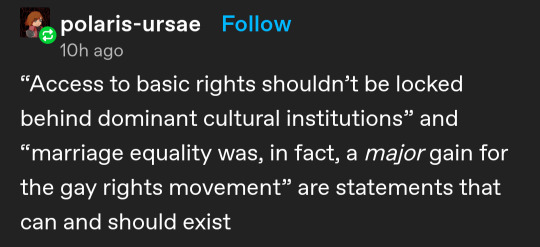
people should be allowed to choose whether or not they want to get married. posting about how people who don't want to get married are idiots and there's no viable reason why a person might choose not to get legally married makes you sound like Jerry Falwell. marriage should be legally accessible by ALL people regardless of disability, gender or sexuality, but basic rights should ALSO be available to all and not, as this person puts it, locked behind dominant cultural institutions
#jerry falwell was like a big marriage and family conservative btw#theres a post I see going around sometimes where they basically assert that the only reason people choose not to get married#is that they think its 'too permanent' and the post is like 'as if buying a house and having kids arent permanent'#reblogging that is an autoblock for me. you have to be such a fucking ridiculous asshole to agree with that post lmfao#people have been choosing to have long term relationships that dont involve marriage for thousands of years#and they have a myraid of different reasons that dont come down to being too dumb to understand long term commitment#how far down your throat does the boot have to be for you to think the institution of marriage should be the only way to access rights#especially if youre american#its hilarious to me seeing tumblr gays coming on here making posts that sound like things southern baptists have said to me#when the missourian thinks you sound like a reactionary evangelical you know its bad
33 notes
·
View notes
Text
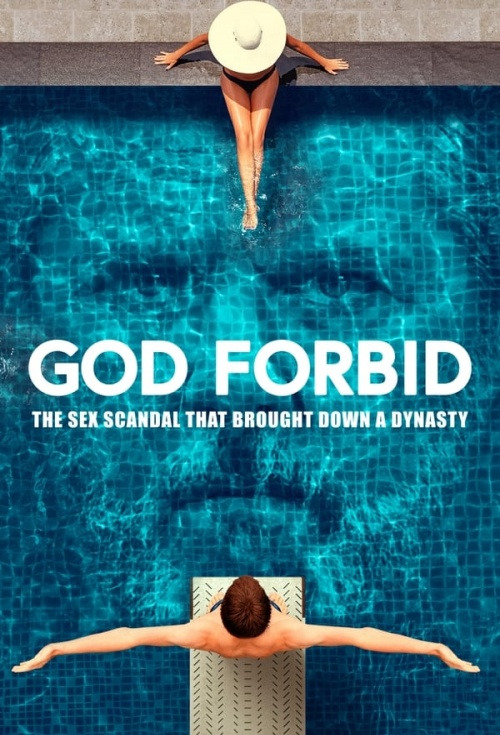


- Let's Docu 'Bout It -
Ep. 2 - God Forbid: The Sex Scandal That Brought Down a Dynasty
In this revealing documentary, Giancarlo Granda, former pool attendant at the Fontainebleau Hotel, shares the intimate details of his 7-year relationship with a charming older woman, Becki Falwell, and her husband, the Evangelical Trump stalwart Jerry Falwell Jr. The documentary outlines Granda's entanglement with the Falwell's seemingly perfect lives and the overarching influence this affair had on a presidential election.
Listen here or wherever you listen to podcasts!
Spotify - Apple - Amazon - Castbox - iHeartRadio - RadioPublic - Google
#podcast#documentary#documentaries#god forbid#god forbid the sex scandal that brought down a dynasty#jerry falwell jr#giancarlo granda#becki falwell#Spotify
18 notes
·
View notes
Text

11 notes
·
View notes
Text
Jerry Falwell
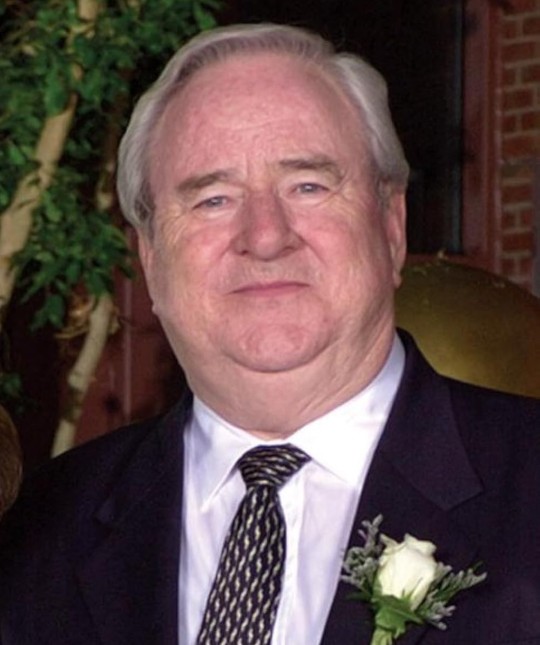
Physique: Stocky, or as I like to think, "packed with holy girth". Height: 6'4", the perfect height for a private confessional… of a different kind.
Jerry Laymon Falwell Sr. (August 11, 1933 – May 15, 2007) was an American Independent Baptist pastor, televangelist, and conservative activist. He founded the Thomas Road Baptist Church, a megachurch in Lynchburg, Virginia, Liberty University, and co-founded the Moral Majority. While many saw him as a prick, he managed to avoid the sex and financial scandals that plagued others, including his son, Jerry Falwell Jr.



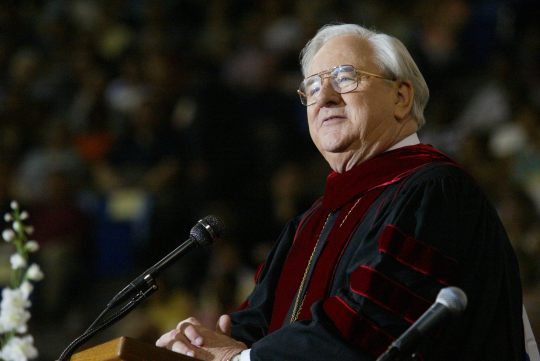

Now, here's the thing: I loathed his preachings but lusted after his presence. That silver hair, that bulk - it was like he was built for sin, not just for sermonizing. There's something undeniably hot about a man who's so strict in public but might be a wild beast in private.
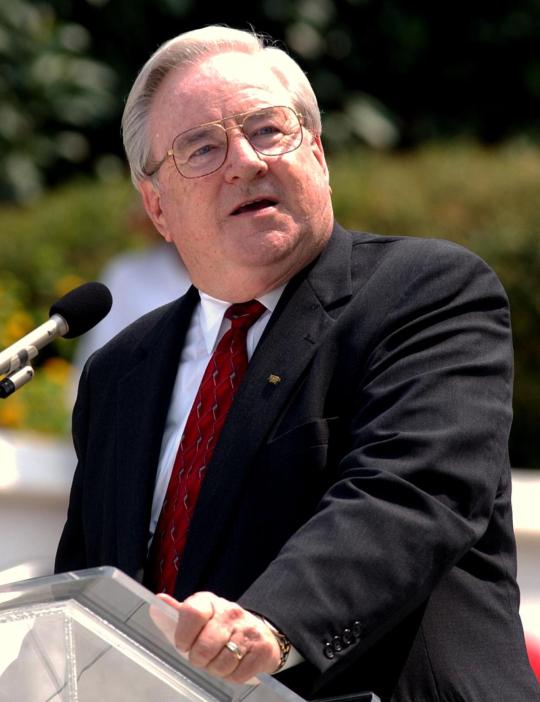

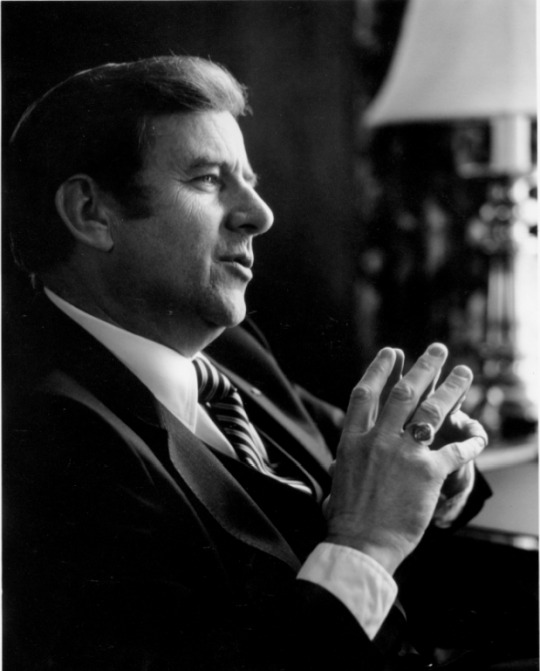


Married for almost 50 years, with three kids, until his death at 73. According to Jerry Jr., he was in an oppressive marriage to a religious prude, where alcohol was a no-go and sex was strictly for procreation. No wonder he was so uptight; if only someone had slipped him a good, deep-throated sermon, we might have seen him sing a different tune. Blowjobs are divine interventions in their own right, right?
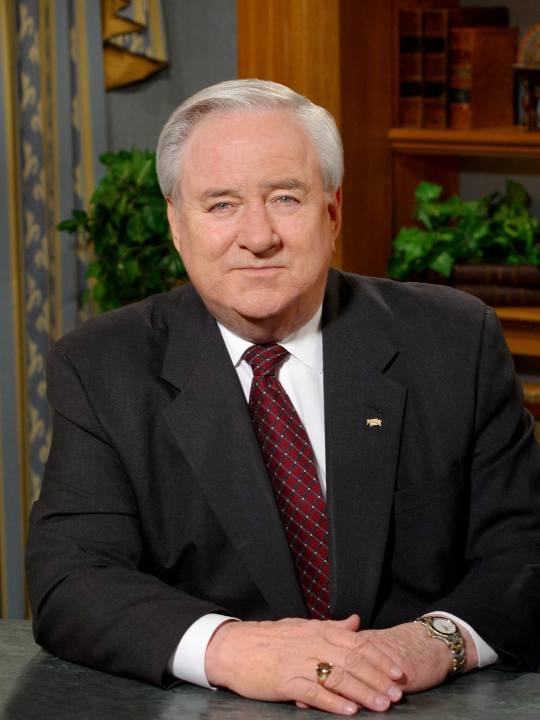
Imagine if someone had just knelt before that altar of his, maybe he would've found a new kind of faith. That kind of blowjob could've been the religious experience he never knew he needed.
98 notes
·
View notes
Text
Peter Montgomery at RWW:
As the aggressive Christian nationalism that infuses the MAGA movement and Republican Party intensifies, journalists and filmmakers are paying closer attention to the threat this political ideology and its adherents pose to freedom in America. A must-watch new documentary, “Bad Faith: Christian Nationalism’s Unholy War on Democracy,” will be available for streaming on AppleTV, Amazon Prime, and Google Play beginning Friday, April 26. Directed by Stephen Ujlaki and Christopher Jacob Jones and narrated by Peter Coyote, “Bad Faith” makes masterful use of archival and current footage of Christian nationalist religious and political figures, infographics, and interviews with scholars, religious leaders, political analysts, and even a former Trump administration official. The film draws a compelling through line from the scheming power-building of Paul Weyrich, the right-wing operative who recruited Jerry Falwell and other evangelical preachers to create the religious-right as a political movement in the late 1970s, to the institution-destroying antidemocratic ambitions of MAGA insiders like Steve Bannon, as well as Donald Trump’s dominionist “prophets” and “apostles” and the Jan. 6 insurrectionists they inspired.
[...]
“Bad Faith” explains how that transformation happened, documenting the role played by the Council for National Policy, a partnership between anti-regulation, economically libertarian oil barons and the religious-right leaders who intended to remake the Republican Party, take over the Supreme Court, and use their political power to enforce “traditional” views of family, sexuality, and gender on the rest of the nation. The Koch brothers poured tens of millions of dollars into “a state-of-the-art political data platform” that Council for National Policy groups use to collect personal information—including personal mental health, behavioral health, and treatment data—and use that information to micro-target individuals. (In “God & Country,” another documentary released earlier this year, Ralph Reed is shown bragging that his organization tracked “147 different data points” on the conservative Christians they targeted for turnout operations.) [...]
As “Bad Faith” makes clear, religious-right leaders viewed Trump as a powerful blunt weapon in a long-term political and spiritual war against the federal government and institutions dominated by progressive forces. “The Council’s gambit had paid off,” the film notes about Trump’s time in office. “Christian nationalists were firmly embedded at the highest levels of government. The Supreme Court had an absolute majority of justices poised to overturn landmark civil and women’s rights decisions. Paul Weyrich’s vision of a Christian nation was becoming a reality.” That explains why Christian nationalist leaders were willing to dismantle democracy to keep Trump in power. Members of the Council for National Policy and its political action arm went into “full combat mode” to promote Trump’s big lie, and, as Right Wing Watch documented, they supported his efforts to keep power after the 2020 election, portraying it as a holy war between the forces of good and evil. As Samuel Perry notes in the film, viewing politics as spiritual warfare between the forces of God and Satan makes it easy for those who see themselves on God’s side to “justify just about anything.”
The Bad Faith: Christian Nationalism’s Unholy War on Democracy documentary comes out today on streaming platforms such as Amazon Prime, Apple TV, and Google Play today. Bad Faith focuses on the history of Christian Nationalism and its very real threat to democracy.
#Christian Nationalism#Bad Faith: Christian Nationalism’s Unholy War on Democracy#Film#Movies#Evangelical Christianity#Dominionism#Paul Weyrich#Jerry Falwell#Stephen Bannon#Koch Brothers#Council For National Policy
11 notes
·
View notes
Photo



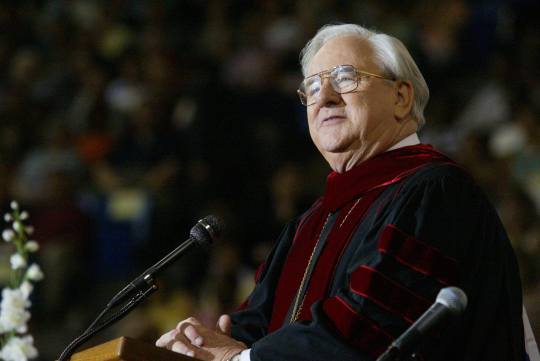
Jerry Falwell Sr. (1933–2007) American Pastor
Falwell was best known for crusading against abortion and homosexuality with a back catalog of homophobic, racist, and misogynistic comments. But if I had a shot with him, think I could have changed him.
What?
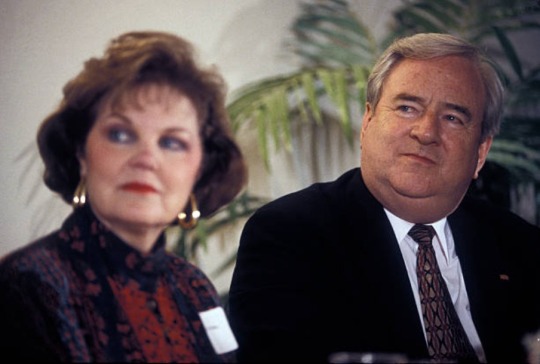
According to his own son, Jerry Falwell Jr., he was in a oppressive marriage to a religious prude who didn't allow alcohol and sex for only procreation. So I bet no blowjobs.
I bet one good blowjob would have rocked his world and change his views on everything.
Blowjobs can work miracles. lol
#Jerry Falwell Sr.#Jerry Falwell#televangelist#handsome daddy#husky daddy#daddy#chubby daddy#suited daddy#suit & tie#celebrities#CILF#sitting#religious figures#eye glasses
108 notes
·
View notes
Text
Hurricanes Helene and Milton are God's punishment on America for Republican anti-trans legislation.
Repent.
Eat the rich.
Vote out the oppressor.
The Kingdom of Heaven is here.
Also, please remember that God's judgement will return next year around the same time for reasons which I have yet to decide.
But fr, please stay safe everybody.
#hurricane milton#hurricane helene#psa#tropical storm milton#climate change#climate crisis#eat the rich#capitalism#late stage capitalism#florida#queer#queer community#jerry falwell
3 notes
·
View notes